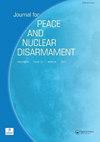中印巴核三角:亚洲安全的必然选择
IF 1.4
Q4 INTERNATIONAL RELATIONS
引用次数: 0
摘要
亚太地区是全球强权政治的新中心。为了遏制中国的崛起,印度加入了美国的行列,形成了对中国“地缘经济”扩张的“地缘政治”回应。印度-中国和印度-巴基斯坦之间复杂的“大陆”争端又增加了一个“海洋维度”,给该地区注入了新的核不稳定风险。负责任地管理竞争正成为一个关键主题。印度的核和军事现代化项目是由地位决定的。印美防务伙伴关系导致印中关系恶化,并扰乱了巴基斯坦和印度之间脆弱的战略平衡。中国和印度之间不太可能发生核冲突。南亚的核风险仍然很高。传统的不平衡和印度的好战迫使巴基斯坦发展一种“全方位”可信的最低限度核威慑学说。本文章由计算机程序翻译,如有差异,请以英文原文为准。
The China–India–Pakistan Nuclear Triangle: Consequential Choices for Asian Security
ABSTRACT Asia-Pacific is the new locus of global power politics. To contain the rise of China, India has joined the United States in shaping a “geo-political” response to China’s “geo-economic” outreach. A “maritime dimension” has been added to the complex “continental” contestations between India–China and India-Pakistan, injecting new risks of nuclear instability in the region. Responsibly managing competition is emerging as a key theme. India’s nuclear and military modernization programs are status driven. The Indo-US defence partnership has led to a worsening of India–China relations and disturbed the tenuous strategic balance between Pakistan and India. A nuclear conflict between China and India is unlikely. Nuclear risks in South Asia remain high. Conventional imbalance and Indian bellicosity have compelled Pakistan to develop a doctrine of “full-spectrum” credible minimum nuclear deterrence.
求助全文
通过发布文献求助,成功后即可免费获取论文全文。
去求助
来源期刊

Journal for Peace and Nuclear Disarmament
INTERNATIONAL RELATIONS-
CiteScore
1.30
自引率
0.00%
发文量
36
审稿时长
12 weeks
 求助内容:
求助内容: 应助结果提醒方式:
应助结果提醒方式:


